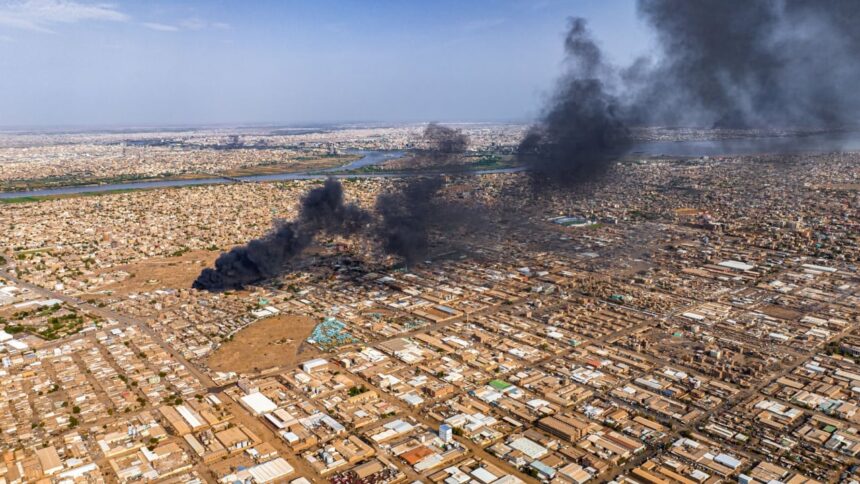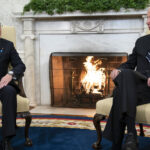Summary by Geopolist | Istanbul Center for Geopolitics:
The article “Can Sudan’s Civilian Front Bring Peace?” from The National Interest examines the challenges and potential of Sudan’s civilian-led political movement in establishing lasting peace in the country. Following the 2019 ousting of long-time dictator Omar al-Bashir, Sudan has struggled with instability, marked by military coups and ongoing conflicts.
Key points discussed in the article include:
- Role of the Civilian Front: Sudan’s civilian front, which includes various pro-democracy groups and civil society organizations, is crucial in pushing for democratic reforms and peace. Their efforts aim to counterbalance the military’s dominance in politics.
- Challenges to Peace: The civilian front faces significant obstacles, such as internal divisions, lack of resources, and the military’s reluctance to relinquish power. Additionally, regional dynamics and international influences complicate the peace process.
- International Support: For the civilian front to succeed, sustained international support is essential. This includes diplomatic backing, economic aid, and pressure on the military to adhere to democratic principles.
- Prospects for Peace: The article suggests that while the path to peace is fraught with difficulties, the resilience and determination of Sudan’s civilian leaders offer a glimmer of hope. Effective collaboration between domestic and international actors could pave the way for a more stable and democratic Sudan.
For a comprehensive understanding, you can read the full article below.
On May 27, a broad cross-section of Sudanese civil society organizations met in Addis Ababa for the founding conference of the Coordination Body of the Democratic Civil Forces of Sudan, or “Taqaddum.” It was a demonstration of strength and unity for Sudan’s civilian front, which is pushing hard for negotiations between the African nation’s warring military factions. Yet, there are major doubts about whether a ceasefire is achievable in the near term. A ceasefire will require sustained pressure from civilian forces and the international community to raise the cost of fighting for the conflict’s primary parties. In the advent of a ceasefire, the likelihood of it breaking down is high. How the agreement is reached and who is involved will have major implications for the sustainability of peace.
The Urgent Need for a Ceasefire
As fighting escalates around North Darfur’s capital of El-Fasher and in other parts of Sudan and the humanitarian crisis worsens, a ceasefire is urgently needed. As of May 24, the Armed Conflict Location and Event Data (ACLED) project documents more than 17,000 direct conflict fatalities. According to the International Rescue Committee, almost 25 million people require humanitarian assistance. The international community must do more to forestall impending famine, address human rights abuses, and ensure humanitarian assistance flows into Sudan. Both sides have blocked aid on multiple fronts. Reaching a ceasefire would be a critical step in unblocking the flow of humanitarian assistance and increasing the level of assistance from the international community, which falls far short of what is needed (only 16 percent of the Sudan Humanitarian Response Plan for 2024 is currently funded, according to Doctors Without Borders).
While the rebel Rapid Support Forces (RSF) have repeatedly agreed to a ceasefire in principle, the Sudanese Armed Forces (SAF) have rebuffed calls for a ceasefire, vowing to fight until victory. On May 29, the deputy chairman of the SAF-controlled Sovereign Council, Malik Agar, rejected overtures by the U.S. secretary of state for SAF to participate in the Jeddah peace process, stating that “going to Jeddah will only happen over our dead bodies.”
Belligerents are unlikely to reach a ceasefire unless both sides view the cost of fighting to be higher than the cost of a ceasefire. Given the SAF’s recent battlefield momentum, this is a difficult proposition. Still, case studies suggest that a robust civilian front working in close coordination with the international community could change the SAF’s calculations and push them and the RSF to the negotiation table.
The civilian front can increase pressure by expanding its reach to include formerly neutral sectors of society—something Taqaddum recently pledged to do—and by forcefully advocating for a clear and coherent vision on the international stage. The international community can increase punitive measures, including sanctions, against RSF and SAF leadership and key members of the SAF’s governing coalition, including businesses and hardline religious groups.
The international community must also increase pressure on international arms suppliers and financiers (including the United Arab Emirates, Egypt, Iran, and Saudi Arabia) to halt their support to combatants. While Taqaddum has called for international intervention, such intervention is unlikely in the near term. Yet, there is substantial room for increased pressure on RSF and SAF, which stops short of military intervention. Sanctions employed thus far against RSF and SAF leadership have been limited, and little action has been taken on a national arms embargo or to meaningfully pressure the belligerents’ international backers.
The Role of Civilians in Negotiations
Civilian forces are rarely included in direct negotiations. There are some examples, such as the Liberia peace process (which culminated in the 2003 Accra Comprehensive Peace Agreement), in which a range of civil society groups (including human rights, women, and legal organizations) were included as official delegates. This has been the exception rather than the rule; however, in the case of Liberia, civilian participation was enabled by the presence of international forces.
In other cases, civilians shaped the process in indirect but significant ways. In Guatemala, strong pressure from civilian groups for a peace process began in the late 1980s. Pressure from the Catholic Church led to the beginnings of a peace process in 1990, and continued pressure from civil society led to the creation of the Civil Society Assembly (ASC) during the 1994 Framework Agreement. The ASC was drawn from across civil society and was mandated to provide non-binding recommendations on substantive issues. The ASC played a significant role during the peace process, which culminated in a final agreement in 1996.
Churches played a crucial role in Mozambique’s 1992 peace agreement, pushing for talks from the outside, meeting bilaterally with combatants, and ultimately serving as mediators during formal negotiations. Civilian groups employed significant pressure to push combatants back to the negotiating table leading up to the peace agreement in Colombia (2016). In Tajikistan (1997) and Sierra Leone (1999), civilian groups played a critical role during the implementation of the peace accord.
Ceasefire’s Limitations
In Sudan’s case, the most likely ceasefire would be an agreement between SAF and RSF that fails to provide a roadmap for negotiations or address any substantive issues. This is likely given the intractability of the issues underlying the SAF-RSF conflict, as well as the pressure from the international community to deny combatants widely (and rightly) perceived as illegitimate the opportunity to chart Sudan’s future constitutional and governance arrangements.
Yet empirical analysis of historical ceasefire data shows that ceasefires on the African continent that include a timeline for negotiations or advance a peace process are twice as likely to be durable (to last beyond the initially scheduled end date), with about a 26 percent success rate compared to a 13 percent success rate for ceasefires that are delinked from substantive negotiations.
Therefore, it is critical that any ceasefire agreement include a roadmap or framework, which can only be credibly produced by the civilian front and civil society. As the U.S. special envoy for Sudan, Tom Perriello, noted in recent remarks, “Civilians shouldn’t just be showing up at talks; civilians should be setting the terms of the debates.” Shaping ceasefire negotiations this way will require a strong push from the international community.
How Civilian Voices Can Shape Negotiations
Empirical studies have shown that settlements that address the underlying political incompatibilities that led to conflict in the first place are more likely to succeed. While much has been made about the personalities of SAF’s Burhan and RSF’s Hemedti and their long and complicated history, there are larger structural forces—and underlying incompatibilities—behind the current war and the preceding coup and revolution.
Following the 2019 revolution against the regime of military dictator Omar al-Bashir, it was likely that there would be a reckoning between military and democratic forces (with military forces temporarily settling the question through the 2021 coup). It was also likely that there would be a reckoning between the dominant Nile Arab elites (and the SAF, which they controlled) and the other Arab groups on the periphery, long employed to do the dirty work of al-Bashir’s regime, first as Janjaweed and later as RSF, but always kept at arm’s length from real political power. It was likely that there would be a reckoning between the forces of Islamism, entrenched as a core element of al-Bashir’s regime, and the growing desire for modern secularism among Sudan’s urban youth. And it was inevitable that there would be a reckoning between the historical over-concentration of economic and political power in the core at the expense of Sudan’s periphery.
Creating a credible framework or roadmap for addressing these incompatibilities requires the strong involvement of Sudanese civil society and political parties, many currently organized under the Taqaddum umbrella, as well as Sudanese youth, whose aspirations are represented by the Sudanese Resistance Committees (RCs) and other organizations. The recently concluded Taqaddum Founding Conference reaffirmed civil society’s commitment to a broad range of principles, from humanitarian access to representation of women and youth to federalism, democracy, and secularism.
Equally essential opportunities, such as a planned convention by the RCs—grassroots organizations that played a significant role in the overthrow of al-Bashir’s regime in 2019 and represent the Sudanese “street”—will produce frameworks and roadmaps. The RCs, in particular, because of their support among youth and local legitimacy in Sudan, are a voice the international community should support and elevate along with its push for an RSF-SAF ceasefire.
Regardless of when substantive negotiations begin, the benefits of a ceasefire are clear in the short term—it can allow for the distribution of humanitarian assistance and protection of civilians and property. Failed ceasefires can also pave the way for successful ones in the future. Any ceasefire should, therefore, be a welcome development. Yet, a durable peace requires substantive negotiations that credibly address underlying incompatibilities, and this cannot be done without the strong involvement of civilian voices and significantly increased international pressure on the SAF, RSF, and their international sponsors.
By: Santiago Stocker – the Resident Program Director for Sudan at the International Republican Institute (IRI). He previously served as Resident Program Director for Nigeria and as a Director in the State Department’s Bureau of Conflict and Stabilization Operations. The thoughts expressed in this piece are his own. Follow him on LinkedIn.
Source: nationalinterest.org
[ad_







